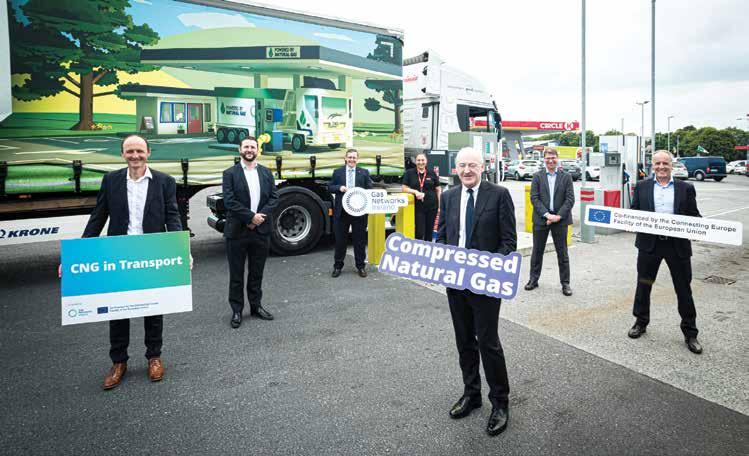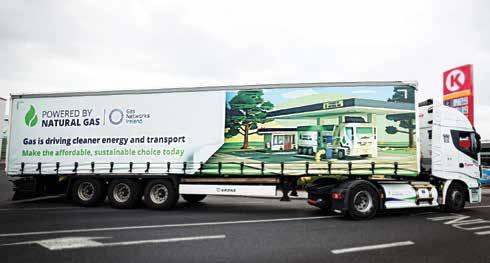
6 minute read
ECO-FRIENDLY
Pictured at the opening of Ireland’s fourth publicly accessible CNG refuelling station at Circle K’s forecourt on the Ballysimon Road in Limerick are Declan O’Sullivan, Programme Delivery Manager, Gas Networks Ireland; Brian Connolly, Senior Pricing Manager; Roy Kavanagh, SME Sales Representative; Anda Bejenariu, Manager Circle K Ballysimon Rd; Mark Holohan, CNG Manager, Virginia International Logistics; Jonathan Diver, Senior Fuels Director, Circle K; Damien Corr, Project Manager, Gas Networks Ireland.
Gas Networks Ireland and Circle K open two new CNG stations in Limerick and Dublin
Ireland is two steps closer to decarbonising the nation’s heavy vehicle transport sector, with the country’s third and fourth publicly-accessible, fast-fill Compressed Natural Gas (CNG) stations, now open at Circle K’s forecourt at Clonshaugh in Dublin and Ballysimon Road in Limerick City.
Strategically located to support prominent transport operator routes, the state-of-the-art stations have the capacity to fill 50 Heavy Good Vehicles (HGVs) a day, with each fill taking no more than five minutes.
The new stations allow hauliers and fleet operators in the region to begin the journey to sustainable transport by switching their fuel from conventional diesel to CNG today and ultimately transition to networked renewable gases, including biomethane and hydrogen, in the future.
Renewable gases are the only deployable at scale, ultra-low carbon alternative fuel for use in HGVs, where electric solutions are not currently viable options, for long distance applications.
Commenting on the ongoing developments and investments Jonathan Diver, Senior Director Fuels at Circle K said: “We are delighted to unveil the latest CNG stations at Circle K Clonshaugh and Circle K Ballysimon Road, further strengthening our natural gas capabilities alongside our Dublin Port and Cashel stations.
“Circle K has longstanding ties to the commercial transport and freight industry and a key priority of ours is supporting this sector as it endeavours to reduce its carbon emissions. Expanding
our network of CNG refuelling stations and continuing to develop our EV charging facilities are both key elements within our overall sustainability agenda.”
Transport currently accounts for 42% of Ireland’s energy use, making it the country’s largest source of energy demand. It is also one of the most difficult sectors to decarbonise. In particular, HGVs and buses generate 30% of road transport emissions despite accounting for just 4% of vehicles on Irish roads.
Proven global technologies, such as CNG, and renewable gases, including biomethane and hydrogen, can all play a part in helping decarbonise Ireland’s transport sector.
Studies show that switching from diesel to natural gas can reduce wellto-wheel CO2 emissions by up to 23% compared to diesel (CENEX, 2019) and nitrous oxide (NOx) by up to 50% (UK Department of Transport, 2018).
The highest emissions savings were achieved under specific conditions, loads and vehicles – in particular, long-haul and regional drive cycles – making natural and renewable gases the ideal fuels for decarbonising Ireland’s HGV and bus fleets.
Furthermore, as the volume of renewable gas on the network increases, vehicles refuelling from the national gas network will increasingly reduce their carbon footprint without needing to change a thing.
Irish companies are now developing
CNG – A vital part of Ireland’s transition to a low carbon commercial fleet
One of Virginia International Logistics’ 25 CNG fuelled HGVs leaving Circle K Ballysimon Road. The ability to refuel in Limerick opens another transport corridor for the haulier’s fleet of CNG trucks and allows them to help even more of their customers to continue reducing the impact of their supply chain on the environment.
Anda Bejenariu, Manager Circle K Ballysimon Road in Limerick where Ireland’s fourth publicly-accessible, fast-fill CNG station is located. The CNG station has the capacity to fill 50 HGVs a day, with each fill taking no more than five minutes and allows hauliers and fleet operators in the region to begin the journey to sustainable transport by switching their fuel from diesel to CNG today and ultimately transition to networked renewable gases, including biomethane and hydrogen, in the future.

sustainable circular economies by purchasing renewable gas made from their own waste to power their operations and vehicles. Virginia International Logistics became the first haulier in Ireland to complete a zero-carbon HGV delivery to Europe, using a truck fuelled by renewable gas for the 1,000km round-trip to Caen in northern France.
The opening of the new CNG station in Ballysimon Road will open another important transport corridor for their 25 CNG trucks.
Transport Director at Virginia International Logistics, Ray Cole said: “As part of our ‘Green Logistics’ policy, introducing CNG fuelled vehicles is one of the ways we are reducing our carbon footprint. The customer demand for alternate fuel transport is also increasing as companies focus even more on having a lower carbon supply chain.
“The ability to refuel in Limerick opens another transport corridor for our fleet of CNG trucks and allows us to help even more of our customers to continue reducing the impact of their supply chain on the environment.”
In 2020, VisionGreen Logistics Solutions Ltd, became the first logistics company in Ireland to make carbon neutral retail deliveries with trucks fuelled by renewable gas made from farm and food waste while Kerry County Council became the first local authority in Ireland to trial a carbon neutral HGV powered by renewable gas, sustainably transporting road salt from Co. Tipperary.
Vision Green co-founder, Ronan Murphy said: “VisionGreen customers tend to be businesses that are conscious of their impact on the environment. CNG enables our clients to reduce emissions in their value-chains and meet some of their long-term sustainability goals, which is something we are really proud of.
“With corporate and social responsibility becoming more and more important for large companies, their customers and investors, being able to offer a lower-carbon transport solution is a strong differentiator for any business.”
A proven, reliable and affordable alternative to diesel, Ireland’s CNG vehicle numbers grew more than 50% in 2020, as the number in Europe passed two million and the number worldwide exceeded 28 million.
Gas Networks Ireland’s Head of Commercial and Corporate Affairs, Ian O’Flynn, said: “Ireland’s commercial transport sector is one of the hardest sectors to decarbonise, but we’re on a journey with hauliers and forecourt operators to reduce emissions through natural gas today and renewable gas down the road.
“CNG stations are directly connected to the national gas network and CNG vehicles are future-proofed for biomethane, which is already available in Ireland. By delivering a network of CNG refuelling stations, we are supporting hauliers and fleet operators to make a sustainable switch to gas-powered vehicles.”
To help Ireland’s fleet operators and hauliers transition to cleaner, affordable CNG vehicles, Gas Networks Ireland has a CNG Vehicle Grant Scheme which provides grants of up to €5,000 for new CNG vehicles, up to a maximum of €60,000 per business.
The CNG Vehicle Grant Scheme is co-financed by the European Union’s TEN-T Programme under the Connecting Europe Facility as part of the Green Connect Project. Applications are now being accepted at -
www.gasnetworks.ie/cngvehiclegrant.
The Department of Transport has also launched a €3m Alternatively Fuelled Heavy Duty Vehicle (AFHDV) Purchase Grant Scheme, which will cover between 40% and 60% of the price differential, with a maximum 20 vehicles or €500,000 available to any one applicant. Grants can be used towards the future purchase of more sustainable vehicles, including gas and electric vehicles.
The development of the CNG network via the Causeway Study is supported by a grant from the EU’s Connecting Europe Facility Transport Fund and the Gas Innovation Fund, approved by the Commission for Regulation of Utilities (CRU). Research is co-funded and conducted by project partner, the National University of Ireland, Galway.
To learn more about the many benefits of CNG for fleet operators and hauliers and the future of renewable gas in transport, visit
www.gasnetworks.ie/cng.











